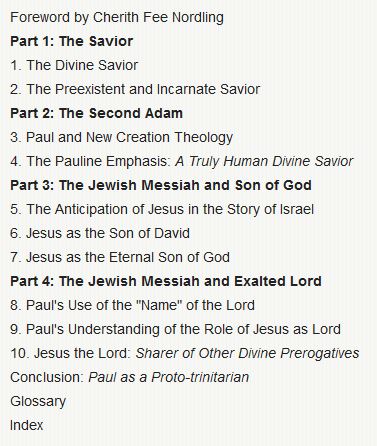Gordon Fee: Jesus the Lord according to Paul the Apostle, reviewed by Craig S. Keener
 The book’s first section, on Jesus as savior, includes chapters on Jesus as divine savior (ch. 1) and Jesus as preexistent and incarnate savior (ch. 2), debated topics that will be revisited at points later in the book. The second section of the book addresses the second Adam, including the new creation (the divine image restored in Christ, ch. 3) and Jesus’s genuine humanity (ch. 4). The third section addresses the Jewish Messiah and Son of God, including the anticipation of Jesus in the story of Israel (ch. 5), Jesus as the son of David (ch. 6), and Jesus as the eternal Son of God (ch. 7). The fourth section, the Jewish Messiah and exalted Lord, includes Paul’s use of the “name” of the Lord (ch. 8), Paul’s understanding of the role of Jesus as Lord (ch. 9), and Jesus’s sharing of other divine prerogatives (ch. 10). After examining all uses of “Lord” in the Pauline corpus, he shows that in Paul they always function as a title for Jesus, usually with reference to Christ’s reign and not applied to his crucifixion with the exception of 1 Thess 2:14-15 (125; but see also 1 Cor 2:8).
The book’s first section, on Jesus as savior, includes chapters on Jesus as divine savior (ch. 1) and Jesus as preexistent and incarnate savior (ch. 2), debated topics that will be revisited at points later in the book. The second section of the book addresses the second Adam, including the new creation (the divine image restored in Christ, ch. 3) and Jesus’s genuine humanity (ch. 4). The third section addresses the Jewish Messiah and Son of God, including the anticipation of Jesus in the story of Israel (ch. 5), Jesus as the son of David (ch. 6), and Jesus as the eternal Son of God (ch. 7). The fourth section, the Jewish Messiah and exalted Lord, includes Paul’s use of the “name” of the Lord (ch. 8), Paul’s understanding of the role of Jesus as Lord (ch. 9), and Jesus’s sharing of other divine prerogatives (ch. 10). After examining all uses of “Lord” in the Pauline corpus, he shows that in Paul they always function as a title for Jesus, usually with reference to Christ’s reign and not applied to his crucifixion with the exception of 1 Thess 2:14-15 (125; but see also 1 Cor 2:8).
I appreciate Fee’s caution regarding Adam Christology at points and whether some passages are genuinely pre-Pauline hymns. Such matters are, of course, debated. Particularly debated, however, and perhaps partly for that reason repeatedly emphasized in the book, are Christ’s preexistence and divine character. Although he balances his treatment with other Pauline emphases, it is here that his intertextual approach seems particularly enlightening.
Paul presupposed both Christ’s preexistence and humanity.

Gordon D. Fee
Most significantly, Paul applies texts about YHWH to Jesus, for example, in Rom 10:9-10 (Joel 2:32) and Phil 2:10 (Isa 45:23). Likewise, the OT “day of the Lord,” referring to YHWH, in Paul becomes the day of Christ (1 Thess 5:2; 2 Thess 2:1-2; 1 Cor 1:8; 5:5; Phil 1:6, 9-10). God’s coming with holy ones in Zech 14:5 applies to Christ in 1 Thess 3:13; YHWH’s coming with fire in Isa 66:15 applies to Jesus in 2 Thess 1:7-8, and the judgment in 2 Thess 1:9 echoes Isa 2:10 LXX. Boasting in YHWH in Jer 9:24 becomes boasting in Jesus in 1 Cor 1:31. YHWH’s mind/Spirit in Isa 40:13 applies to Christ in 1 Cor 2:16. Also likely, God revealing hidden matters in darkness in Dan 2:22 applied to Jesus in 1 Cor 4:4-5. This may contrast with the rarer use of indubitably Davidic-messianic passages from the prophets in Pauline literature (Fee cites the allusion to Isa 11:4 in 2 Thess 2:8; one may add at least the quotation of Isa 11:10 in Rom 15:12).
Category: Biblical Studies, Winter 2019


